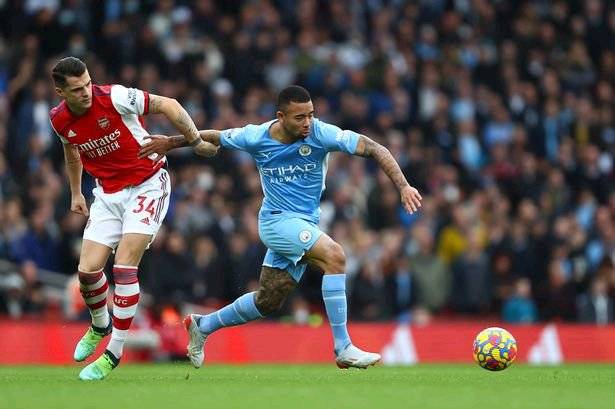Manchester City hasn't sold to a domestic rival in a decade, but that will change this summer.
Arsenal are expected to sign Manchester City forward Gabriel Jesus.
Manchester City have followed some very obvious principles on their way to becoming the dominant force in English football: avoid strengthening opponents whenever possible, and weaken opponents whenever possible. The last time the club sold a player to a rival was in 2012, when they sold Emmanuel Adebayor to Tottenham. Since then, they have acquired Gael Clichy, Bacary Sagna, and Samir Nasri from Arsenal, Frank Lampard from Chelsea, Raheem Sterling from Liverpool, and Kyle Walker from Tottenham.
Minimizing the damage when selling a player is smart business, which explains why City were relaxed about selling Leroy Sane to Bayern Munich rather than an English team and ecstatic when Dortmund came in for wantaway prospect Jadon Sancho in 2017; the Blues knew they had to sell but were finding it difficult to stomach accepting a bid from an interested English side due to the greater potential for it to show up on a more regular basis.
So, why is Txiki Begiristain willing to accept the sale of Gabriel Jesus to Arsenal and Sterling to Chelsea this summer? What has changed to indicate that City is willing to lend a helping hand to their rivals (for the right price)?
The economic climate can explain some of this. Before the pandemic, the revenues received and generated by English clubs dwarfed those on the continent, to the point where, in 2018, a report found that 17 of the top 20 earners in Europe from broadcasting revenues were English clubs.
With everyone feeling the effects of the global health crisis over the last two years, fewer clubs can afford the transfer fees and wages that are standard among the Premier League's top teams. If players want to leave the Etihad, their best option is to join another club in the same division.
But there is something else at work, and that is increased confidence within the City Football Academy walls that they will be strong enough to hold off rivals as a result of the rest of the transfer business they have done and are doing. While Liverpool's bids have yet to be tested, there is no aversion to working with and assisting Arsenal or Chelsea this summer.
Such a shift in attitude could be seen two years ago at the academy level, when City agreed to pay United £750,000 for teenage striker Charlie McNeill rather than taking the decision to a tribunal. The Blues believed that there was enough talent in the rest of the academy for one of them to run.
McNeill has progressed at United and was one of their FA Youth Cup winners this season, but the fact that City has won the league at Under-18 and Under-23 levels in each of the two years since the transfer would support their decision at the time. City's loss has not always been United's gain.
That is the case with Jesus and Sterling right now. Both players' game time will be threatened by newcomers Erling Haaland and Julian Alvarez, with Haaland in particular expected to command a starting spot in most games, particularly the most important ones.
Both Jesus and Sterling, if they sign with rival clubs, could jeopardize City's chances of winning the league next season.



No comments yet
Be the first to share your thoughts!